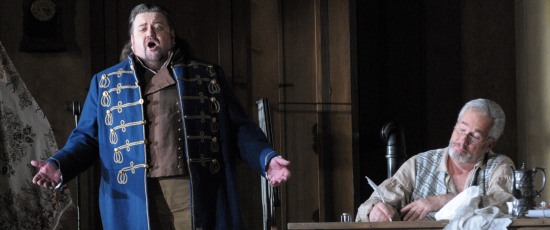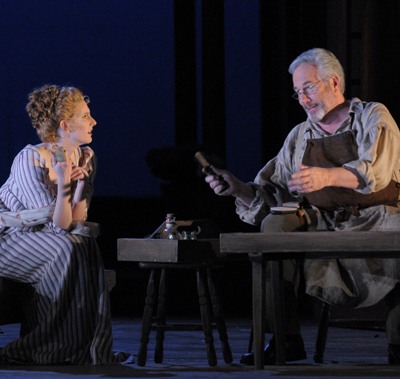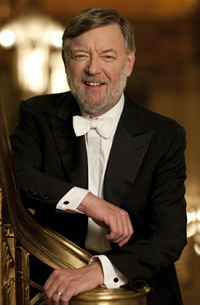Lyric Opera cobbles together heart and hilarity to create the perfect fit for ‘Die Meistersinger’
 Review: “Die Meistersinger von Nürnberg,” a comic opera by Richard Wagner, in German with English captions, at the Lyric Opera of Chicago through March 3. ★★★★
Review: “Die Meistersinger von Nürnberg,” a comic opera by Richard Wagner, in German with English captions, at the Lyric Opera of Chicago through March 3. ★★★★
By Nancy Malitz
Trust me on this: The Lyric Opera of Chicago’s new co-production of “Die Meistersinger von Nürnberg” is five and a half hours short, due first and foremost to Lyric music director Andrew Davis, whose Wagner is luminous, and to the original concept of Scottish director David McVicar, who first brought the show to life at the Glyndebourne Opera Festival in 2011.
 Together they positively animate Wagner’s benevolent town portrait by taking delight in each whimsical detail and endearingly flawed character as the burghers’ annual singing competition approaches, and with it, a quandary: In a tradition enshrined in rules, how do you make room for the new?
Together they positively animate Wagner’s benevolent town portrait by taking delight in each whimsical detail and endearingly flawed character as the burghers’ annual singing competition approaches, and with it, a quandary: In a tradition enshrined in rules, how do you make room for the new?
Wagner being Wagner, the cast is huge, the vocal demands enormous, and the third act of this opera is longer than “La bohème” in its entirety. But the Lyric’s response is impressive indeed. This production, revived under the direction of Marie Lambert, is burbling with life, funny and sad, and it’s bountiful in singing talent.
At the story’s center is the bittersweet act of generosity by an aging poet-cobbler who nudges the innocent young woman he adores, along with her infatuated suitor, an equal innocent of great talent, toward their shared best destiny.
 It is quite touching to witness bass-baritone James Morris in this role of Hans Sachs, the reliable shoe-maker and revered master singer whose quiet sacrifice — much like that of Strauss’ female equivalent, the aristocratic Marschallin — is the beating heart of this story.
It is quite touching to witness bass-baritone James Morris in this role of Hans Sachs, the reliable shoe-maker and revered master singer whose quiet sacrifice — much like that of Strauss’ female equivalent, the aristocratic Marschallin — is the beating heart of this story.
Long a star of the opera stage who has traversed all the great Wagner and Verdi roles for the bass-baritone voice, Morris in the fullness of his maturity still retains that pure lyric beauty in his upper range, capable of aching tenderness, which is a different sort of intensity than sheer physical power. To this listener, it translates as essential wisdom, and thus makes him an insightful casting choice. When Morris is onstage, the unavoidable truth felt by the artist and the man Hans Sachs registers with brutal, exquisite grace.
The story takes place in Nuremberg – updated in this production from the 1500s the early 1800s, a time when modern Germany did not yet exist, but when dozens of German-speaking states, united by culture, were attempting to better organize.
 Designer Vicki Mortimer’s set has a simple unit piece – a bit of vaulted ceiling on narrow pillars — that serves as a hallowed outdoor canopy for the competition and as the structural bones for various interiors such as the studio where Sachs plies his cobbler trade. It’s modestly grand in a burgher-ish sort of way, and except for the outdoor competition, which could have used a better hint of nature’s verdant splendor along with a bit more room for the celebrating populace, the concept worked well.
Designer Vicki Mortimer’s set has a simple unit piece – a bit of vaulted ceiling on narrow pillars — that serves as a hallowed outdoor canopy for the competition and as the structural bones for various interiors such as the studio where Sachs plies his cobbler trade. It’s modestly grand in a burgher-ish sort of way, and except for the outdoor competition, which could have used a better hint of nature’s verdant splendor along with a bit more room for the celebrating populace, the concept worked well.
Nuremberg became strong through its arts and crafts guilds, alliances that codified training and protected trade secrets. The master singers were one such guild, rich in tradition, yet, as Wagner portrays it, ossified and resistant to change. The rules prove daunting to the newcomer Walther von Stolzing , who has extraordinary but raw singing talent.
Walther wants to marry Eva, who’s equally smitten, but her father has said she can marry only a master singer. Walther is played by tenor Johan Botha, who fits the bill with his unforgettable ringing top. Eva is Ryan Opera Center grad Amanda Majeski, all manner of lovely as the ingénue.
 The competition field is limited to the few men who qualify by the book, among them the preening town clerk, Sixtus Beckmesser, who thinks he has got life and art down to a set of dry rules he can privately manipulate in his pursuit of the town’s beauty.
The competition field is limited to the few men who qualify by the book, among them the preening town clerk, Sixtus Beckmesser, who thinks he has got life and art down to a set of dry rules he can privately manipulate in his pursuit of the town’s beauty.
Danish baritone Bo Skovhus is a most endearing nemesis. Luckily the directorial conceit allows for his very human crash and burn at the end, which is a boon for Skovhus, whose acting range is large. We can’t help but sympathize at Beckmesser’s public humiliation.
Given the arrival of newcomer Walther von Stolzing and the love angle, we all know how this story is going to turn out. Morris and Botha are wonderful in the third act, when the elder Sachs helps the younger Walther cobble together a prize song from the memory of a dream. It’s the night’s most profound singing. The telling of the entire tale is a prolonged delight, with many twists and turns underscored by some of Wagner’s most glorious music.
 The Lyric Opera chorus and supernumeraries make up a rambunctious populace that helps us explore the strong tension between old wisdom and new truth brought on by the competition. They pile it on in a hilarious town brawl that makes you want to jump up and join in. The chorus sounds superb. Turns out it’s also quite good in a fight. Who knew?
The Lyric Opera chorus and supernumeraries make up a rambunctious populace that helps us explore the strong tension between old wisdom and new truth brought on by the competition. They pile it on in a hilarious town brawl that makes you want to jump up and join in. The chorus sounds superb. Turns out it’s also quite good in a fight. Who knew?
No “Meistersinger” succeeds without deep casting. Here the Lyric draws strength from America’s own opera training guilds for the story’s beta couple — the eager apprentice David and his buttercup Magdalene, who has him wound around her little finger.
The first act of “Meistersinger” would fall flat without David. Ryan Opera Center alum David Portillo is a natural for this role — agile, articulate, musically smart. His explanation of the rules of master song is a highlight, and his sense of fun is key throughout. Mezzo-soprano Jamie Barton, a winner of the Metropolitan Opera’s 2007 national council auditions and an important emerging artist, is charming, bubbly and big of voice – a Magdalene who keeps David on his toes.
The opera also makes use of an able crew of character singer-actors who constitute the town’s master singers, with colorful names like Nachtigall and Vogelgesang, at various life stages from sophomore to senility. They are a superb and slightly goofy lot of distinctly drawn individuals, who together bring the town to life.
 Shaping this long opera into an engaging whole is the ultimate responsibility of the conductor, and it’s impressive that Davis manages Wagner’s demands as smoothly as if there had been only 15 minutes of challenges to solve. The Lyric Opera Orchestra sounds all the more sweeping and voluptuous for its many contrasting episodes of delicacy and whimsy. Davis saves the best for last, too. That final scene, in all its pageantry, is a glory.
Shaping this long opera into an engaging whole is the ultimate responsibility of the conductor, and it’s impressive that Davis manages Wagner’s demands as smoothly as if there had been only 15 minutes of challenges to solve. The Lyric Opera Orchestra sounds all the more sweeping and voluptuous for its many contrasting episodes of delicacy and whimsy. Davis saves the best for last, too. That final scene, in all its pageantry, is a glory.
Note: The Lyric was rocked at the “Meistersinger” dress rehearsal when a non-singing actor, playing a fire-breather on stilts, accidentally caught fire himself. The actor is recovering, but the role has been cut from the carnival setting of the competition scene.
Related Links:
- Performance location, dates and times: Go to LyricOpera.org
- Story of the opera: Read an overview at LyricOpera.org
- More images and audio: Check out the 2011 premiere at Glyndebourne Opera Festival
Captions and credits: Home page and top: Walther von Stolzing (Johan Botha) tries to craft a song in time for the master singer competition, with help from the poet-cobbler Hans Sachs (James Morris.) Descending: The townspeople are in a mood to celebrate as the competition gets underway. Eva (Amanda Majeski) and Hans Sachs (James Morris) adore each other, but Sachs realizes he’s too old for her. Sixtus Beckmesser (Bo Skovhus) tries to serenade Eva, but Hans Sachs (James Morris) hammers away mischievously. Sixtus Beckmesser (Bo Skovhus) is big on rules. Walther von Stolzing (Johan Botha) masters his song in time. Sir Andrew Davis is music director of the Lyric Opera. Below: Hans Sachs (James Morris, center) watches as Beckmesser (Bo Skovhus, right) prepares to make a fool of himself.
Tags: Amanda Majeski, Andrew Davis, Bo Skovhus, David McVicar, David Portillo, Die Meistersinger von Nurnberg, James Morris, Jamie Barton, Johan Botha, Marie Lambert, Vicki Mortimer


